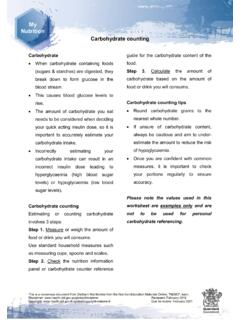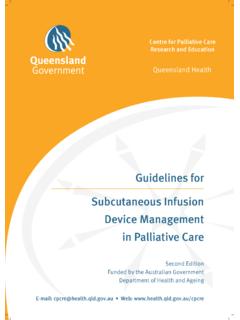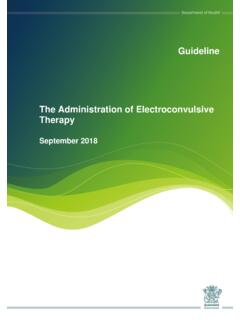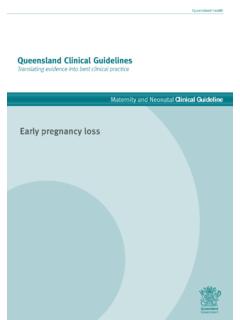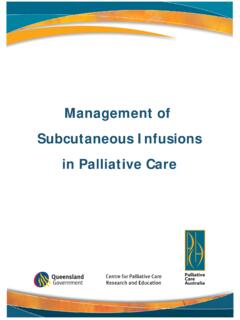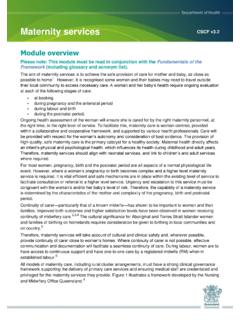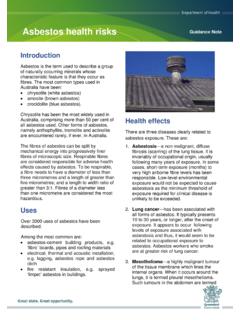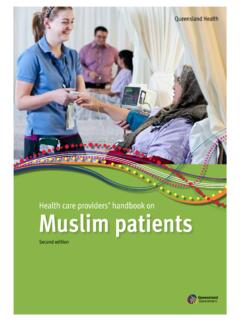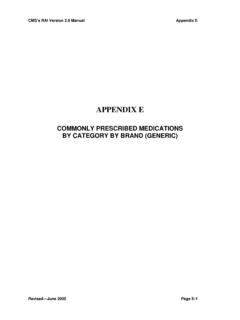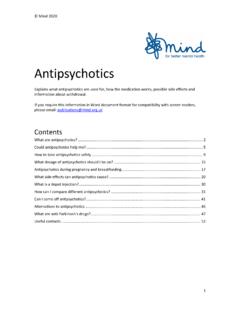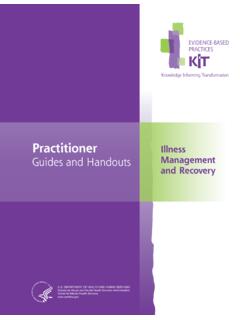Transcription of Fact sheet: Schizophrenia
1 fact sheet :SchizophreniaWhat is Schizophrenia ? Schizophrenia is an illness that affects the normal functioning of the brain; it interferes with a person s ability to think, feel and act. A person with Schizophrenia typically experiences changes in behaviour, perception and thinking that can distort his or her sense of reality. When a person loses touch with reality, he or she is experiencing a usually first appears in people aged between 15 and 25 years, although it can appear later in life. It affects approximately one per cent of the population. About 25 per cent of people who have Schizophrenia experience a complete recovery, 40 per cent experience recurrent episodes of acute illness and 35 per cent remain chronically are the symptoms of Schizophrenia ?
2 The onset of illness may be rapid, with acute symptoms developing over several weeks, or it may be slow, developing over months or even years. During onset, the person often withdraws from others, may become depressed and anxious and may develop unusual ideas or extreme fears. Noticing these early signs is important for early access to treatment. Early recognition and effective early treatment is vital to the future wellbeing of people with symptoms of Schizophrenia can be described as positive or negative. In this case, positive does not mean good, but refers to the psychotic symptoms that show the person has lost touch with reality. Negative symptoms are less obvious but have a profound effect on day-to-day living.
3 Impairments in cognition and degrees of functional disability are common. Cognitive deficits involving memory, planning ahead and maintaining focus interfere with vocational ability and impact on treatment and rehabilitation. Page 43 For more information also see the following MIND Essentials resources Caring for the person experiencing hallucinations and Caring for a person experiencing delusions .SchizophreniaPage 44 Positive symptoms u Delusions false beliefs that are foreign to the person s background and that cannot be altered with logic or reason. The content is usually influenced by cultural or individual factors, and may include ideas of a persecutory, grandiose or religious Hallucinations sense perceptions that have no external stimuli.
4 These can occur in any of the senses (taste, smell, sight, hearing and touch). Most commonly, people experience voices that no one else can Thought disorder lack of logic in thoughts and dialogue. The person s speech may be difficult to follow, with him or her jumping from topic to topic with no logical connection. The conversation may head off the topic altogether and be very hard to follow. Negative symptomsu Loss of drive loss of motivation to begin and complete tasks. This can interfere with activities of daily living such as personal care, cooking, work or study. This is a result of the impact of the illness on brain function, not simply Blunted emotions greatly reduced ability to express emotion.
5 This may be accompanied by a lack of, or inappropriate response to, happy or sad is impor tant to note the following:u Social withdrawal may occur as a result of a combination of the above symptoms, leaving the person lonely and isolated, unable to work or pursue leisure Lack of insight, because some experiences are so real, can mean that it is common for people with Schizophrenia to deny that they are ill and therefore refuse to accept causes Schizophrenia ?No single cause of Schizophrenia has been identified, but a number of different factors are believed to contribute to the onset of the illness in some people. Some of these are discussed factors A predisposition to Schizophrenia can run in families.
6 In the general population, only one per cent of people develop the illness. However, if one parent suffers from Schizophrenia , the children of the family have a 10 per cent chance of developing the condition (and a 90 per cent chance of not developing it).Pregnancy and birth Foetal abnormalities possibly related to trauma or infection have beencomplications identified as contributing structure Imaging has identified changes such as enlarged ventricles, decreasedabnormalities blood flow, decreased metabolic activity, cerebral atrophy and decreased volume of temporal lobes (including the hippocampus and the thalamus) as being associated with factors Certain biochemical substances in the brain (especially a neurotransmitter called dopamine) are believed to be involved in this condition.
7 One likely cause of this chemical imbalance is the person s genetic predisposition to the illness. The roles of glutamate and serotonin are also being explored further. SchizophreniaPage 45 Family relationships No evidence has been found to support the suggestion that family relationships cause the illness. However, some people with Schizophrenia are sensitive to any family tension, which for them may be associated with It is well recognised that stressful incidents often precede the onset of Schizophrenia . Predisposed individuals may be susceptible to the stress-vulnerability model of illness. Stress impacts on brain structure and can result in reduction in the size of the , misunderstandings and factsThere is significant stigma associated with, and a great deal of misinformation about, Schizophrenia .
8 This often increases the distress to the person and his or her family. Myths, misunderstanding, detrimental stereotypes and negative attitudes surround the issue of mental illness and in particular Schizophrenia . They result in stigma, isolation and common questions about Schizophrenia are discussed people with Schizophrenia have split personalities?No. Schizophrenia refers to the change in the person s mental function, where thoughts and perceptions become disordered. People with Schizophrenia do not have multiple people with Schizophrenia intellectually disabled?No. The illness is not an intellectual disability. However, neurocognitive impairment can occur and this may affect memory, attention and planning skills, which are needed for work or study.
9 Difficulty coping with day-to-day activities (such as managing money, problem-solving and attention to self-care) can have an impact on the person s independence. For some people with persistent symptoms, difficulty with learning and planning requires graded rehabilitation strategies. Others are able to function normally when people with Schizophrenia dangerous?No. People with Schizophrenia are generally not dangerous when receiving appropriate treatment. However, a minority of people with the disorder become aggressive when experiencing an untreated acute episode, because of their hallucinations or delusions. Usually the aggressive behaviour is directed toward the self, and the risk of suicide can be people with Schizophrenia addicted to their drugs?
10 No. The medication helps reduce the severity of the symptoms. The specific medications for treatment of Schizophrenia are not 46 What treatment is available?The most effective treatment for Schizophrenia involves education, medication, psychological strategies and rehabilitation in the community. Positive symptoms in 80-90 per cent of people will respond to antipsychotic medication; however, the impact on the person s family as well as his or her sense of identity, lifestyle and work options also need to be considered to aid relapse prevention and is important to review progress regularly and monitor side effects. Comorbid substance use, mood or anxiety disorders should also be actively treated.
